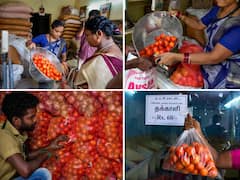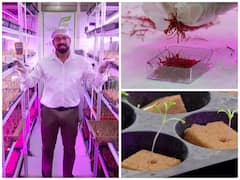'Giant Leap': Minister Mansukh Mandaviya On Govt Approving Launch Of Nano Liquid DAP Fertilisers
IFFCO Nano DAP has been approved by the ministry of agriculture and notified in the Fertiliser Control Order (FCO) based on its encouraging results, IFFCO managing director U S Awasthi said.

New Delhi: Union Chemicals and Fertilisers Minister Mansukh Mandaviya on Saturday said the government has approved the launch of nano liquid DAP (di-ammonium phosphate) fertiliser for the benefits of farmers and making the country self-reliant.
Fertiliser cooperative IFFCO, which introduced nano liquid urea in 2021, on Friday announced that the government has approved the launch of its nano DAP fertiliser in the market.
"After nano urea, the government has now given approval to nano DAP as well," Mandaviya said in a tweet.
Another Giant Leap For Indian Fertilizer & Krishi sectors!
— Dr Mansukh Mandaviya (@mansukhmandviya) March 4, 2023
Nano DAP has been approved by @AgriGoI & notified in the Fertiliser Control Order.
It will bring positive difference in the lives of our farmers & help in fulfilling PM @NarendraModi Ji's vision of Aatmanirbhar Bharat. https://t.co/zys297ryRz
He tweeted that this is one more achievement towards achieving self sufficiency in fertilisers.
This is going to benefit farmers, Mandaviya said.
On Friday, IFFCO managing director U S Awasthi tweeted that the IFFCO Nano DAP has been approved by the ministry of agriculture and notified in the Fertiliser Control Order (FCO) based on it's encouraging results.
"IFFCO will manufacture #NanoDAP; a game changer for Indian agriculture & economy," he tweeted.
In December, Awasthi had said IFFCO would soon launch nano DAP at Rs 600 per 500-ml bottle, a move that will help India save foreign exchange and also reduce government subsidy significantly.
One bottle will be equivalent to one bag of DAP, which currently costs Rs 1,350.
IFFCO is also planning to launch nano-potash, nano-zinc and nano-copper fertilisers, he had said.
In June 2021, IFFCO launched nano urea in liquid form as an alternative to conventional urea.
It has set up many manufacturing plants in Gujarat and Uttar indiato produce nano urea.
There is no government subsidy on nano urea and it is being sold at Rs 240 per bottle.
For conventional urea, the government provides a huge subsidy to ensure that the farmers get the soil nutrient at a reasonable price.
The country's domestic urea production is around 26 million tonnes, while demand is about 35 million tonnes. The gap is met through imports.
India also imports DAP and MoP (muriate of potash) in huge quantities to meet its domestic demand. PTI MJH HVA
Related Video
Breaking News: Maharashtra Politics Shifts: Congress Suspensions Boost BJP Ahead of Local Body Polls





































